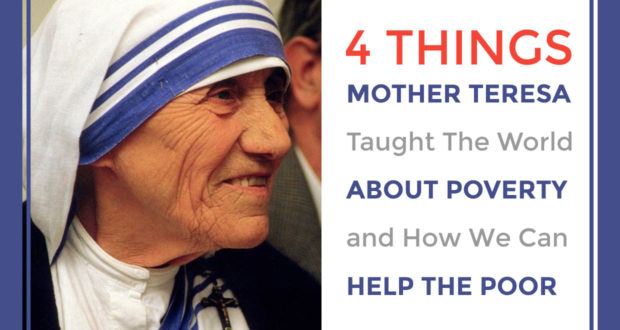Today, we celebrate the feast of Blessed Teresa of Calcutta. This is an appropriate time to look back on her incredible life that changed the world, so that we may look forward in our own lives to try to continue her beautiful work. The following is just a short reflection about a few of the ways that she shaped, and continues to shape, our notion of poverty and how we can help the poor.
1) Poverty is freedom.
Though materials are a good, and the raw materials of the earth are gifts from God, we are tempted to elevate their value beyond that of higher goods like love, family, and faith. We begin to put our hope and trust in materials, rather than in God. And once that trust gets strong, we can begin to fear poverty. But Mother Teresa suggests that it is not the presence of goods that gives us peace—it is often the absence.
“Poverty is freedom. It is a freedom so that what I possess doesn’t own me, so that what I possess doesn’t hold me down, so that my possessions don’t keep me from sharing or giving of myself.” Mother Teresa (2010-10-04). No Greater Love (pp. 96-97). New World Library. Kindle Edition.
The luxuries of the world often require attention and upkeep. Maybe the answer for many of us is to free ourselves of those items that seem to take up so much of our attention, so that we may focus on giving of ourselves.
2) Poverty is about love.
Mother Teresa taught us that the most devastating form of poverty often did not involve a lack of material riches, but a lack of love. She writes:
“…there is a far greater kind of poverty. It means being unwanted, unloved, and neglected . It means having no one to call your own.” Mother Teresa (2010-10-04). No Greater Love (p. 101). New World Library. Kindle Edition.
With all the material riches in the West, there is a terrible scarcity of love. But we can help change that. We can be a friend to others. We can be the one they call their own.
3) The wealthy and the poor need each other.
In a world preaching class warfare that amounted to the deaths of millions of people, Mother Teresa offers this advice:
“We have no right to judge the rich. For our part, what we desire is not a class struggle but a class encounter, in which the rich save the poor and the poor save the rich.” Mother Teresa (2010-10-04). No Greater Love (pp. 97-98). New World Library. Kindle Edition.
While communists viewed class struggle and violence as the inevitable result of a difference in wealth, Mother Teresa saw something different. Rather than a springboard for violence, she believed that a dissimilarity in wealth created an opportunity; the poor offered the rich an opportunity for charity, while the rich offered the poor the chance to practice humility. The difference in class offered the chance for sanctity.
4) Poverty is Personal.
Many of us spend a lifetime looking for something great to do, and forego the small achievements of life. If we can’t do something that makes us feel important, we decide to do nothing at all. Perhaps she was thinking about that kind of person in this famous quote attributed to her:
“If you can’t feed a hundred people, then feed just one.”
Life offers us few chances to feed a hundred people at a time, but it seems to offer us a chance to feed one person almost every day. Alleviating one’s poverty is not only about feeding him with material nourishment; it is about knowing him and loving him. It is personal. And this “feeding” goes beyond food—it is often to provide spiritual and emotional nourishment as well. It might be hard for us to comfort a hundred people today, but we can start with just one person.
It will matter to him.
It will matter to you.
And it will matter to God.
Header Image CC Túrelio

 Seton Magazine Catholic Homeschool Articles, Advice & Resources
Seton Magazine Catholic Homeschool Articles, Advice & Resources
